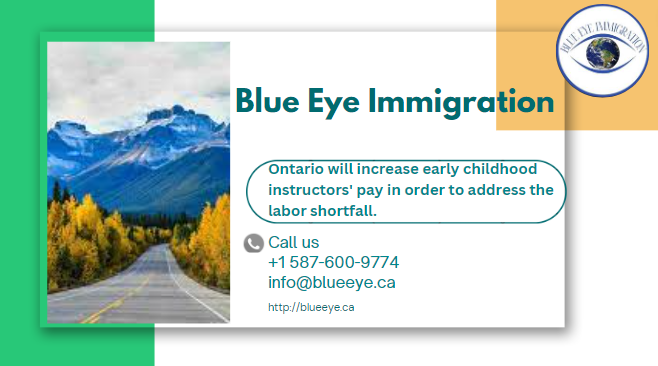Early childhood educators’ (ECEs) minimum pay at the majority of registered child care centers in Ontario will rise to $23.86 per hour starting next year, from the previously scheduled $20 increase. With this boost, the province wants to alleviate the shortages impeding the national $10-a-day program’s expansion.
Proponents claim that the lack of qualified early childhood educators has stunted the sector’s expansion, forcing some centers to close their doors due to staffing shortages.
In November, Education Minister Stephen Lecce unveiled his childcare workforce plan, which included raising the wage floor—a move that the government claims would elevate Ontario’s ECE beginning earnings from among the lowest in the country to among the highest.
It is anticipated that Ontario will have established 86,000 additional seats under the national child-care system by 2026, but ministry officials have issued a warning that the province may lack 8,500 ECEs by then.
An deal Ontario made with the federal government to participate in the $10-a-day scheme included a salary baseline of $18 per hour in 2022, with annual increases of $1 to $25.
Lecce’s new plan calls for raising the floor to $23.86 per hour the next year and going up by $1 per hour after that, reaching $25.86 in 2026.
Canada’s $10 per day national approach
No matter where they reside, all Canadian families should have access to excellent, reasonably priced, and flexible early learning and childcare, according to the government of Canada.
92% of licensed childcare centers and home daycares have already reduced childcare center rates for families with children by 50%, and by 2026, the average daily charge is expected to drop to $10.
These goals apply to all regions outside of Quebec, where there is already a well-established, reasonably priced early learning and childcare system. There are already regulated daycare programs in nearly half of all provinces and territories that cost $10 per day on average or less.
In addition to being critical for the development of children, accessible, high-quality childcare also advances gender equality by enabling more parents—especially mothers—to enter the workforce and increase their financial stability.
When combined, affordable childcare would boost the nation’s economy, encourage more women to pursue careers, and assist ensure that every Canadian kid has the greatest possible start in life.
Jobs for early childhood educators in Canada
In order to predict job openings and job seekers during the 2022–2031 period for the majority of employment kinds in Canada, the Canadian government website provides a study of important labor market variables such as job vacancies and employment growth.
229,100 persons worked in childcare or early childhood education in Canada in 2021. Their estimates state that between 2022 and 2031, there will be 108,800 additional job opportunities, and 91,500 new job seekers would be needed to fill them.
In terms of labor supply, it is anticipated that around 75% of job seekers—mostly college graduates—are school dropouts. The remaining 25% of job searchers will be immigrants, as this industry is highly popular with recent arrivals, particularly women.
According to the government website, job prospects for early childhood educators (ECEs) in Ontario are expected to be favorable between 2022 and 2024. The perspective is influenced by the following factors:
- Increased employment will result in a number of new roles.
- Retirements will result in a moderate number of posts becoming vacant.
- There are a fair amount of jobless individuals with recent experience in this field.
